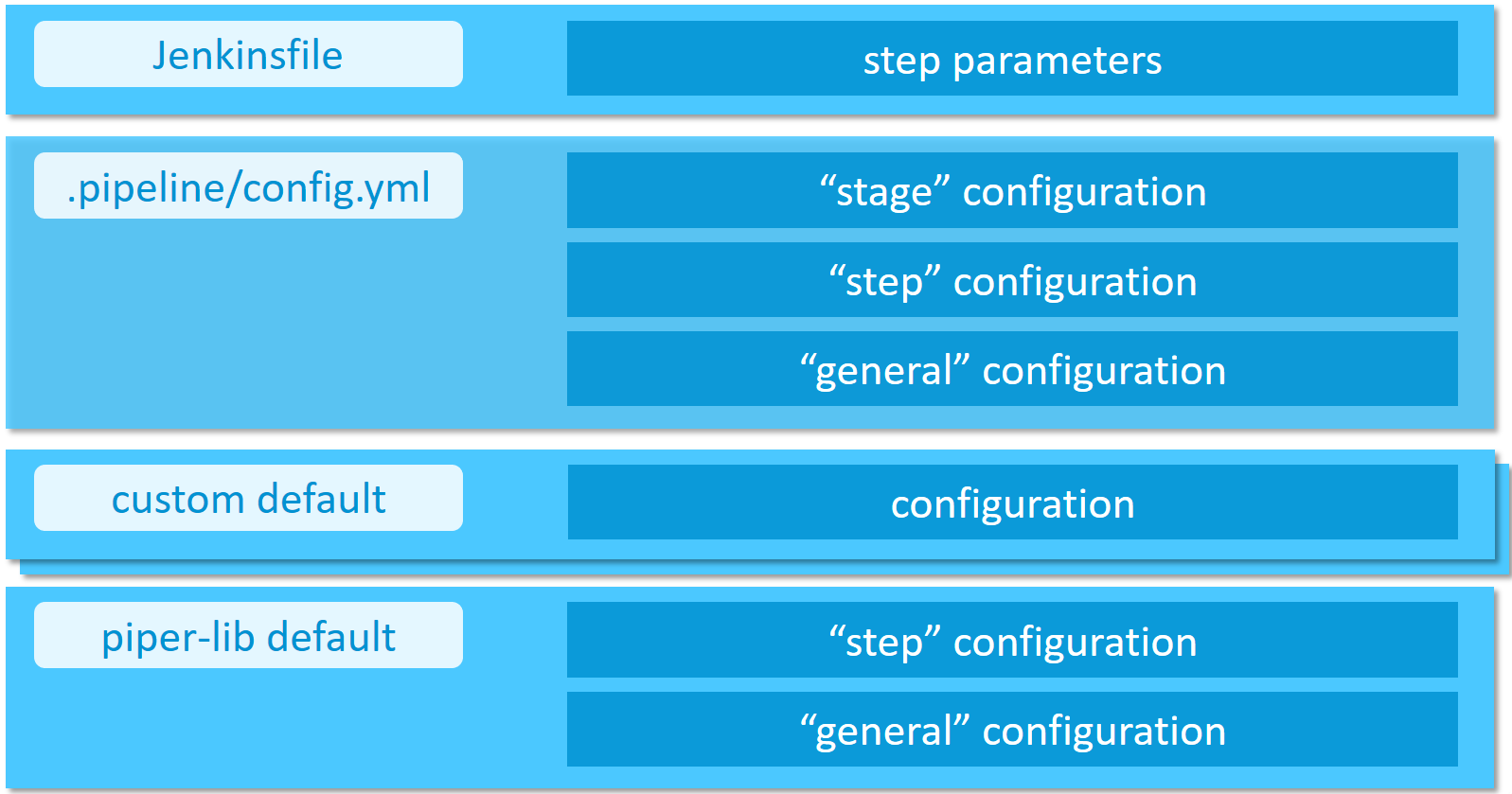* fix Markdown issue 'Headers should be surrounded by blank lines' * fix MD012 * fix MD022 * fix MD026 * fix MD007 * fix MD032 * fix MD038 * fix MD040 * fix MD031 * fix MD034 * fix MD004 * fix new findings * fix MD036 * fix MD038 * fix MD032 * fix MD006
3.9 KiB
Configuration
Configuration is done via a yml-file, located at .pipeline/config.yml in the master branch of your source code repository.
Your configuration inherits from the default configuration located at https://github.com/SAP/jenkins-library/blob/master/resources/default_pipeline_environment.yml.
!!! caution "Adding custom parameters" Please note that adding custom parameters to the configuration is at your own risk. We may introduce new parameters at any time which may clash with your custom parameters.
Configuration of the Piper steps as well the Piper templates can be done in a hierarchical manner.
- Directly passed step parameters will always take precedence over other configuration values and defaults
- Stage configuration parameters define a Jenkins pipeline stage dependent set of parameters (e.g. deployment options for the
Acceptancestage) - Step configuration defines how steps behave in general (e.g. step
cloudFoundryDeploy) - General configuration parameters define parameters which are available across step boundaries
- Default configuration comes with the Piper library and is always available
Collecting telemetry data
In order to improve this Jenkins library we are collecting telemetry data.
Data is send using com.sap.piper.pushToSWA
Following data (non-personal) is collected for example:
- Hashed job url, e.g.
4944f745e03f5f79daf0001eec9276ce351d3035hash calculation is done in your Jenkins server and no original values are transmitted - Name of library step which has been executed, like e.g.
artifactSetVersion - Certain parameters of the executed steps, e.g.
buildTool=maven
We store the telemetry data for not longer than 6 months on premises of SAP SE.
!!! note "Disable collection of telemetry data" If you do not want to send telemetry data you can easily deactivate this.
This is done with either of the following two ways:
1. General deactivation in your `.pipeline/config.yml` file by setting the configuration parameter `general -> collectTelemetryData: false` (default setting can be found in the [library defaults](https://github.com/SAP/jenkins-library/blob/master/resources/default_pipeline_environment.yml)).
**Please note: this will only take effect in all steps if you run `setupCommonPipelineEnvironment` at the beginning of your pipeline**
2. Individual deactivation per step by passing the parameter `collectTelemetryData: false`, like e.g. `setVersion script:this, collectTelemetryData: false`
Example configuration
general:
gitSshKeyCredentialsId: GitHub_Test_SSH
steps:
cloudFoundryDeploy:
deployTool: 'cf_native'
cloudFoundry:
org: 'testOrg'
space: 'testSpace'
credentialsId: 'MY_CF_CREDENTIALSID_IN_JENKINS'
newmanExecute:
newmanCollection: 'myNewmanCollection.file'
newmanEnvironment: 'myNewmanEnvironment'
newmanGlobals: 'myNewmanGlobals'
Access to configuration from custom scripts
Configuration is loaded into commonPipelineEnvironment during step setupCommonPipelineEnvironment.
You can access the configuration values via commonPipelineEnvironment.configuration which will return you the complete configuration map.
Thus following access is for example possible (accessing gitSshKeyCredentialsId from general section):
commonPipelineEnvironment.configuration.general.gitSshKeyCredentialsId
Access to configuration in custom library steps
Within library steps the ConfigurationHelper object is used.
You can see its usage in all the Piper steps, for example newmanExecute.
